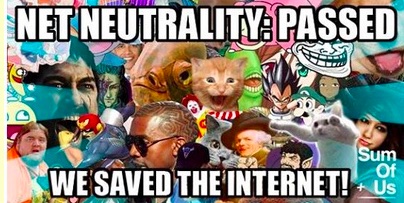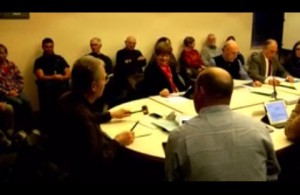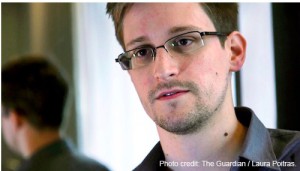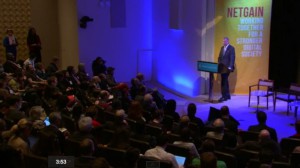FREE FLOW OF INFORMATION
an article by Pressenza International Press Agency (Reprinted according to creative commons licenses 4.0) (abridged)
Breaking news: in an historic victory of global importance, the US Federal Communications Commission just passed rock solid rules to ensure the Internet stays open and free for generations to come. . .
Click here to enlarge photo
Just six months ago, we were facing staggering odds. Big corporations like US cable TV giant Comcast had spent more than $750 million lobbying for a corporate- controlled Internet. Google, the biggest lobby in the industry, was refusing to speak up. The FCC chair Tom Wheeler, a former Big Cable lobbyist, was hostile to Net Neutrality.
But against all odds, we’ve pulled off one of the biggest victories in the history of the Internet, in what the New York Times called “the longest, most sustained campaign of Internet activism in history”, won by “an army of Internet activists.”Together, here’s a snapshot of some of the amazing things we’ve done:Submitted tens and tens of thousands of comments to the FCC in support of Net Neutrality, making sure the agency received more comments than ever before on a public consultation.
Flooded FCC offices with thousands of phone calls, to build internal pressure for the agency to do their job and protect the open Internet.
Tied FCC chairman Tom Wheeler to his past as a former Big Cable lobbyist on social media and his personal Twitter account, forcing him to publicly choose a side.
Helped turn out hundreds of people to emergency rallies and vigils across the country, including outside the White House.
Organized tens of thousands of people to speak up online and on the phone to demand Google publicly support real Net Neutrality.
Pulled off a creative protest to bring Internet slow lanes to life by literally putting private buses transporting Google employees to work in a SumOfUs-created “Slow Lane”.
Worked together with a huge coalition of amazing groups like Demand Progress, Free Press, Fight for the Future, Color of Change, and too many others to count.
And it worked! Following each piece of the campaign President Obama, FCC chairman Tom Wheeler, and Google all came out in support of Net Neutrality — and now the FCC has adopted an official decision to protect Net Neutrality.
But even though we’ve won this crucial fight, we must stay vigilant.
Big telecom corporations like Verizon and Comcast are already working with conservatives in the US Congress to try and undermine our win. We need to be ready to put the pressure on again in the coming months to make sure we don’t lose an inch of our progress.
Up against corporate millions, this decision to protect Net Neutrality is a massive victory for citizen campaigning. Thanks to all of us, we can finally say 2015 was the year we won Net Neutrality. Let’s keep working together to make sure it stays that way.
Thanks for all you do,
Taren, Paul, Nick, Nicole, and the team at SumOfUs
Is Internet freedom a basic human right?
Here are additional remarks from the speech by Mary Robinson.It has been inspiring to see how new communications technologies have allowed us to expand the space for public debate in recent years. The internet has enabled an explosion of information and expression worldwide, and while I am sceptical about claims that Twitter and Facebook ‘caused’ events like the Arab Awakening, it is evident that social media was an indispensable tool in the dissemination of uncensored information and the coordination of public protests in the region.
This raises questions concerning the role of companies and highlights a critical gap – many business leaders are taking major decisions on their own, often without a firm understanding of their impacts on human rights. To help mainstream respect for human rights in corporate decision-making, the European Commission has embarked on a project to develop guidance for three critical industry sectors, including information and communication technologies, which are so important in today’s world. My colleagues at the Institute for Human Rights and Business and Shift are working with the Commission to develop this guidance in order to give practical meaning to the UN Guiding Principles on Business and Human Rights, which were adopted in 2011.
As these tools become more accessible to people around the world – by 2020 there will be an estimated 5 billion people with access to the internet – civil society becomes better-equipped to engage in public life. Citizens have used mobile phones and internet platforms to record human rights abuses, pressure leaders to become more accountable, and connect and work together across borders. As one young Egyptian told us, “the only borders now are on maps.”
At the same time, our expectations are getting higher – and this is a good thing. When we are used to finding information freely available online, we expect to have the right to access that information without restriction. When we see various world leaders on Twitter, we expect to be able to contact our own leaders directly through such platforms. The more we grow accustomed to voicing our opinions online, the more we resist being silenced.
I believe this is part of a broader global trend towards greater participation. There is such a strong desire now to be consulted – really consulted, not just in a tokenistic way – and to be involved in government as opposed to just being objects of someone else’s policy decisions. We must embrace this trend; by supporting greater inclusivity and participation in governance, we will strengthen the development of democracy worldwide.



